End dump trailers are indispensable in various industries, offering versatility and efficiency in transporting bulk materials. However, the risk of tipping over poses significant safety hazards and operational disruptions. At CarMax Vehicle, we understand the critical importance of preventing such incidents. This article delves deep into the factors contributing to end dump trailer tipping, explores preventive measures, and outlines best practices to ensure safe and reliable operations.
Understanding the Dynamics of End Dump Trailers
End dump trailers are designed to tilt forward, allowing easy unloading of materials. Their design and functionality, while advantageous, can make them susceptible to tipping under certain conditions. To effectively prevent tipping, it’s essential to comprehend the underlying dynamics.
Key Components Influencing Stability
| Component | Influence on Stability |
|---|---|
| Load Distribution | Uneven or improper loading shifts the center of gravity. |
| Trailer Design | Height, width, and structural integrity affect balance. |
| Suspension System | Adequate suspension ensures smooth load handling and stability. |
| Tire Condition | Properly maintained tires enhance grip and handling. |
| Road Conditions | Slippery or uneven terrains increase tipping risks. |

Center of Gravity and Its Impact
The center of gravity (CG) plays a pivotal role in trailer stability. A higher or improperly positioned CG can lead to increased tipping likelihood, especially during sudden maneuvers or uneven terrain traversal.
Common Causes of End Dump Trailer Tipping
Identifying the primary causes of tipping is the first step toward prevention. The following factors are frequently responsible for end dump trailer instability:
Improper Loading Practices
- Uneven Load Distribution: Concentrating weight on one side or at the rear can destabilize the trailer.
- Overloading: Exceeding the trailer’s weight capacity raises the CG, making tipping more probable.
- Sharp Edges and Tall Loads: Loading materials with sharp edges or excessive height disrupts balance.
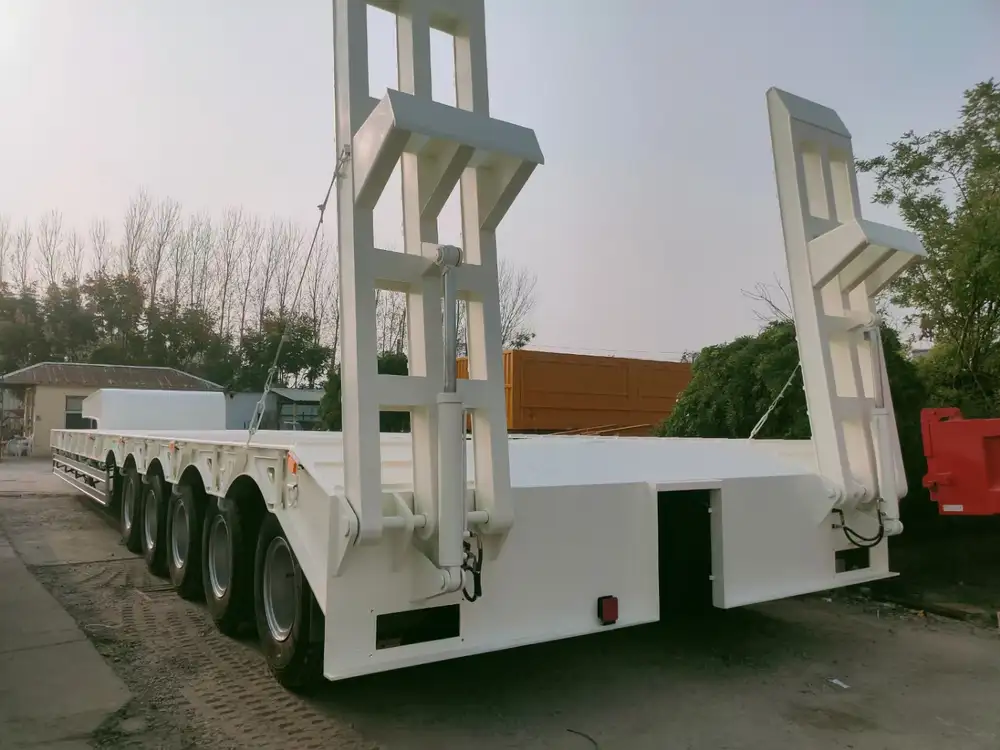
Inadequate Trailer Design
- High Platform Height: Elevated platforms can elevate the CG, increasing tipping risk.
- Narrow Track Width: A narrower base reduces stability, making the trailer more susceptible to tipping.
- Weak Structural Components: Insufficient reinforcement can lead to deformation under load stress.
Driver Error and Maneuvering
- Sudden Turns and Braking: Abrupt maneuvers can shift the load abruptly, leading to instability.
- Speeding: Excessive speeds reduce reaction time and control, heightening tipping chances.
- Inexperienced Drivers: Lack of training in handling end dump trailers can result in improper vehicle handling.
Road and Environmental Conditions
- Uneven Surfaces: Potholes, gravel roads, and uneven terrains can destabilize the trailer.
- Wind Gusts: Strong winds can sway the trailer, especially with tall or lightweight loads.
- Slippery Conditions: Rain, ice, or mud reduce traction, increasing the likelihood of tipping.
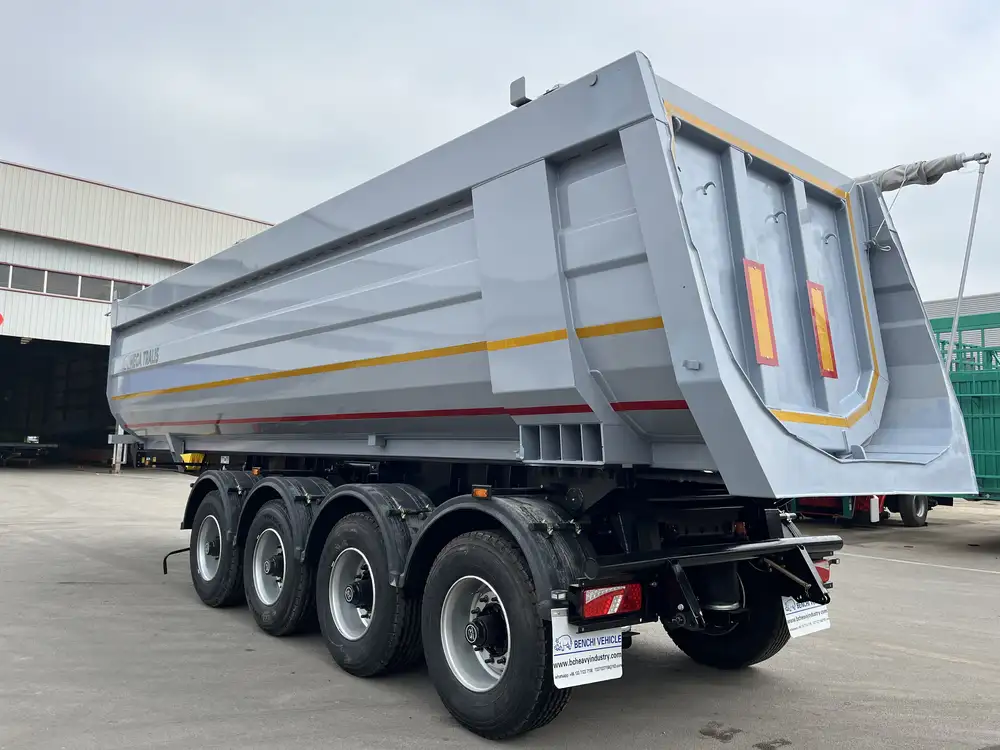
Preventive Measures to Enhance Trailer Stability
At CarMax Vehicle, we emphasize comprehensive strategies to mitigate tipping risks. Implementing these measures ensures safer operations and prolongs the lifespan of your end dump trailers.
Optimal Loading Techniques
- Balanced Load Distribution: Ensure weight is evenly spread across the trailer, maintaining the CG as low and central as possible.
- Adhere to Weight Limits: Strictly follow the manufacturer’s weight capacity guidelines to prevent overloading.
- Secure Loads Properly: Use appropriate restraints and securing mechanisms to keep materials stable during transit.
Advanced Trailer Design Features
- Low-Profile Platforms: Designing trailers with lower platforms reduces the CG, enhancing stability.
- Wider Track Widths: Increasing the base width improves balance and reduces the tipping risk.
- Reinforced Structures: Utilizing high-strength materials and reinforcing key areas ensures structural integrity under heavy loads.
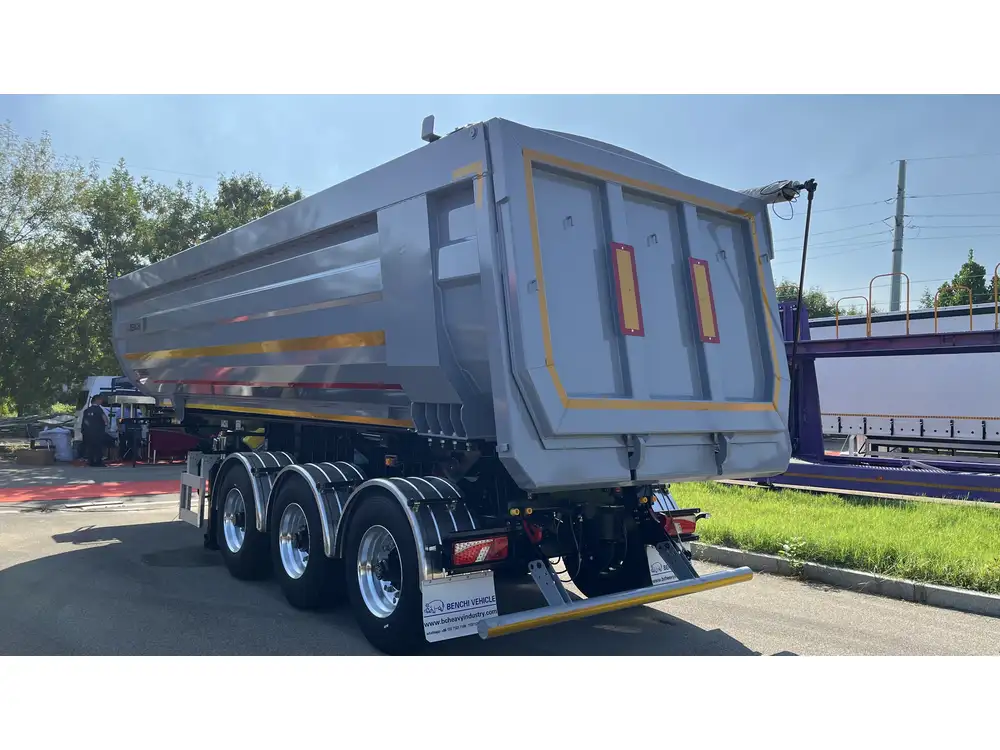
Enhanced Suspension Systems
A robust suspension system absorbs shocks and maintains load stability, even on rough terrains. CarMax Vehicle integrates advanced suspension technologies to enhance trailer performance and stability.
Quality Tires and Maintenance
- High-Grip Tires: Equip trailers with tires that offer superior traction to handle various road conditions.
- Regular Inspections: Routine tire checks for wear and proper inflation prevent handling issues that could lead to tipping.
Driver Training and Best Practices
Educating drivers on proper handling techniques is crucial. Training programs should cover:
- Safe Maneuvering: Techniques for smooth turns and gradual braking to maintain load stability.
- Speed Management: Adhering to speed limits appropriate for the terrain and load.
- Emergency Protocols: Procedures to follow in case of unexpected instability or tipping.

Implementing Technology for Enhanced Safety
Leveraging modern technology can significantly reduce the risk of end dump trailer tipping. CarMax Vehicle incorporates cutting-edge solutions to bolster safety measures.
Stability Control Systems
Advanced stability control systems monitor trailer movements in real-time, alerting drivers to potential tipping scenarios and assisting in corrective actions.
Load Monitoring Sensors
Integrating load sensors ensures continuous monitoring of weight distribution and CG, enabling immediate adjustments if imbalances are detected.
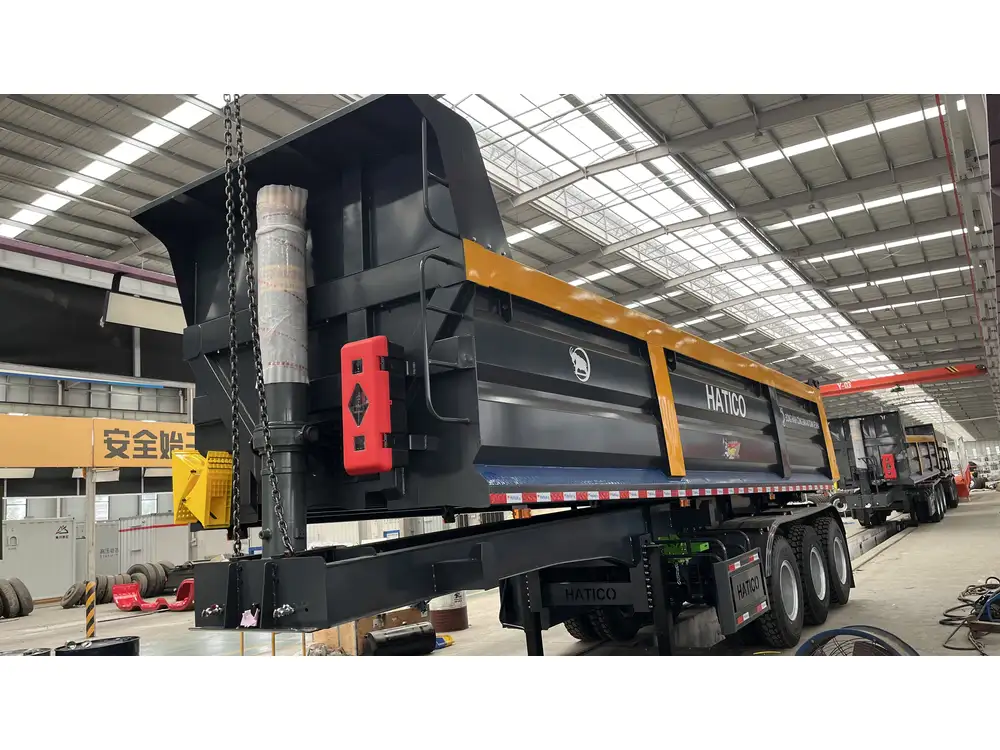
GPS and Telematics
GPS systems provide real-time data on road conditions, allowing drivers to anticipate and navigate challenging terrains more effectively.
Regular Maintenance and Inspections
Consistent maintenance is fundamental in preventing mechanical failures that could lead to instability. Establish a maintenance schedule that includes:
- Structural Inspections: Regularly check for any signs of wear, corrosion, or damage to the trailer’s frame and components.
- Suspension and Brake Systems: Ensure these critical systems are functioning optimally to maintain control and stability.
- Tire Maintenance: Keep tires properly inflated and replace them when tread wear becomes significant.
Emergency Preparedness and Response
Despite best efforts, incidents can still occur. Preparing for emergencies minimizes the impact and enhances safety.

Emergency Equipment
Equip trailers with essential safety gear, such as:
- Reflective Markers: Improve visibility during emergencies or low-light conditions.
- First Aid Kits: Provide immediate medical assistance if needed.
- Fire Extinguishers: Address potential fires promptly to prevent escalation.
Response Training
Ensure that both drivers and support staff are trained in emergency response procedures, including:
- Stabilizing the Trailer: Techniques to prevent further movement and reduce tipping risks.
- Communication Protocols: Clear steps for notifying emergency services and coordinating responses.
Best Practices for Safe End Dump Trailer Operations
Adopting industry best practices enhances overall safety and operational efficiency.

Comprehensive Training Programs
Invest in thorough training for all personnel involved in handling end dump trailers. Focus on:
- Operational Techniques: Safe loading, unloading, and maneuvering practices.
- Safety Protocols: Understanding and implementing safety measures to prevent tipping.
Regular Safety Audits
Conduct periodic safety audits to identify and address potential risks. Assess compliance with safety standards and implement necessary improvements.
Collaboration with Experts
Partner with industry experts and leverage their insights to continuously enhance trailer design and safety measures. CarMax Vehicle regularly collaborates with safety consultants to stay ahead of industry standards.
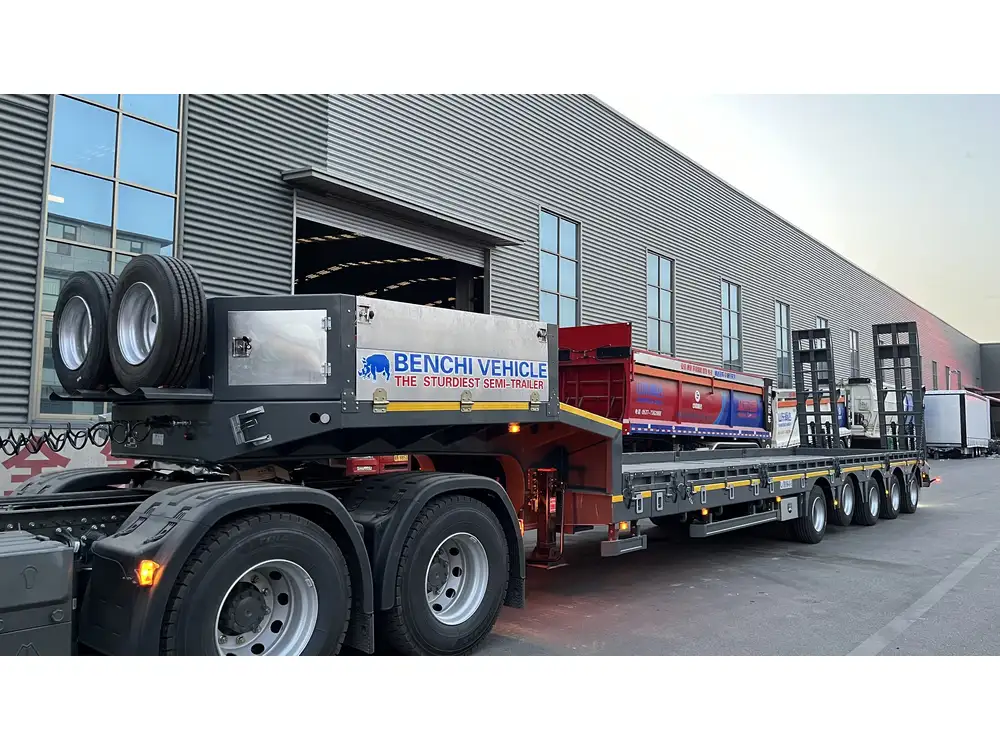
Designing for Stability: CarMax Vehicle’s Approach
At CarMax Vehicle, our commitment to safety drives our design and manufacturing processes. We integrate the latest technologies and best practices to produce end dump trailers that prioritize stability and reliability.
Innovative Design Features
- Aerodynamic Structures: Reduce wind resistance and enhance stability during transit.
- Modular Components: Allow for easy adjustments and customization based on specific operational needs.
- Durable Materials: Utilize high-strength, lightweight materials to balance load capacity and trailer weight.
Rigorous Testing and Quality Assurance
Each trailer undergoes extensive testing to ensure it meets stringent safety standards. Our quality assurance processes include:
- Stress Testing: Simulate various load conditions to assess trailer performance and stability.
- Field Trials: Real-world testing to validate design effectiveness under diverse operational scenarios.
- Continuous Improvement: Incorporate feedback from testing and field operations to refine and enhance trailer designs.
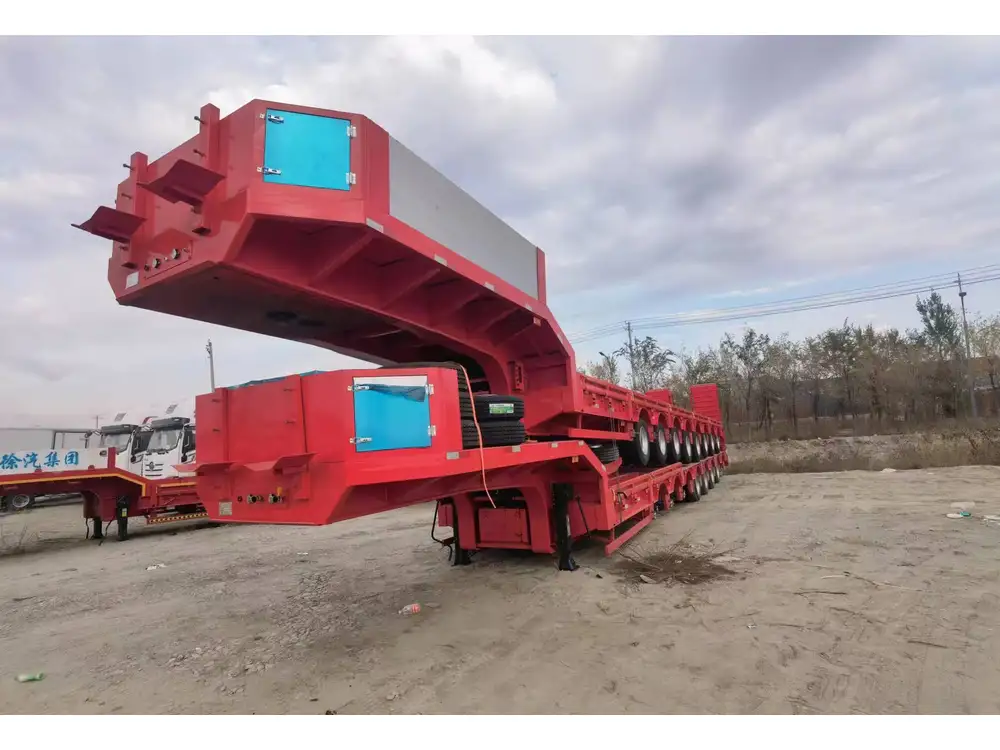
Case Studies: Successfully Preventing Tipping Incidents
Real-world examples illustrate the effectiveness of our preventive measures.
Case Study 1: Optimizing Load Distribution
A construction company experienced frequent tipping incidents with their end dump trailers. CarMax Vehicle collaborated to redesign the loading procedures and trailer structure. By implementing balanced load distribution techniques and reinforcing the trailer frame, the company saw a 90% reduction in tipping incidents within six months.
Case Study 2: Advanced Stability Control Implementation
A mining operation faced challenges with trailers tipping on uneven terrains. Installing our advanced stability control systems enabled real-time monitoring and automatic adjustments, resulting in enhanced trailer stability and safer operations in challenging environments.

Future Innovations in Trailer Stability
The pursuit of safety and efficiency drives continuous innovation. CarMax Vehicle is at the forefront of developing new technologies to further reduce the risk of end dump trailer tipping.
Autonomous Trailer Systems
Integrating autonomous technologies to assist drivers in maintaining optimal load balance and navigating challenging terrains, thereby minimizing human error and enhancing overall safety.
Smart Load Management
Developing intelligent load management systems that automatically adjust load distribution based on real-time data, ensuring persistent balance and stability throughout the journey.

Enhanced Material Science
Researching and utilizing advanced materials that offer higher strength-to-weight ratios, enabling trailers to carry heavier loads without compromising stability.
Conclusion
Preventing end dump trailer tipping is a multifaceted challenge that requires a combination of proper loading techniques, advanced trailer design, comprehensive training, and regular maintenance. At CarMax Vehicle, we are dedicated to providing high-quality trailers equipped with the latest safety features to ensure your operations are both efficient and secure. By implementing the strategies outlined in this article, you can significantly reduce the risk of tipping incidents and enhance the overall safety of your fleet.
Frequently Asked Questions
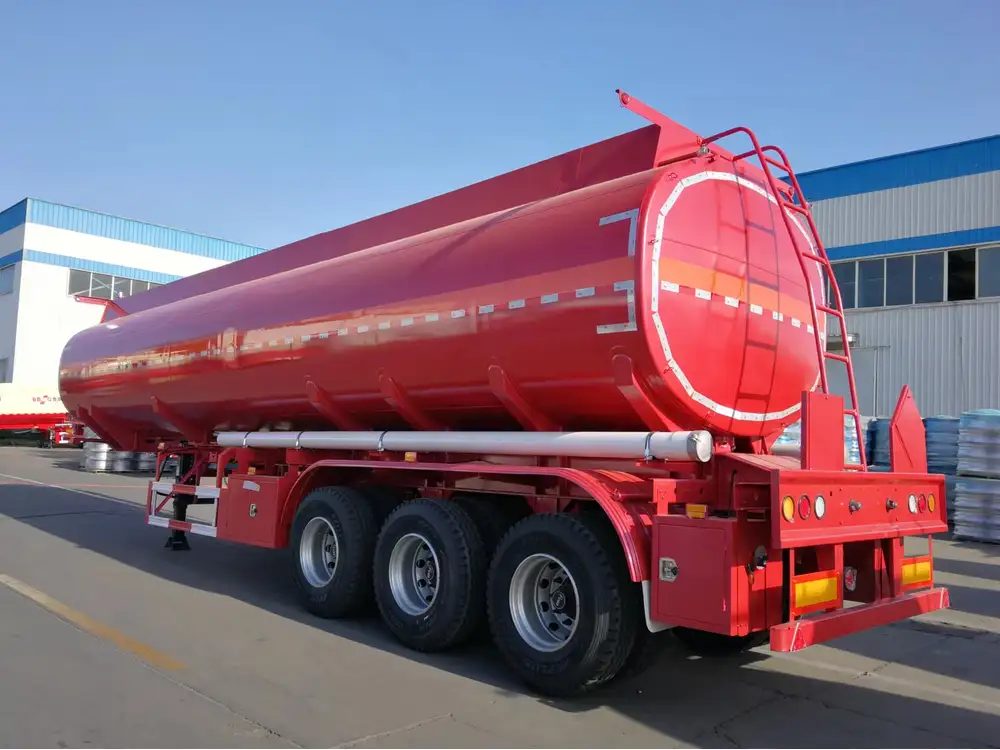
1. What are the most common signs that an end dump trailer is at risk of tipping over?
Common signs include uneven load distribution, excessive height of the load, noticeable trailer sway, and difficulty maintaining control during maneuvers. Regular inspections can help identify these risks before they lead to accidents.
2. How can I ensure my trailer is loaded correctly to prevent tipping?
Ensure that the load is evenly distributed, does not exceed the trailer’s weight capacity, and is secured properly using restraints. Consulting the trailer’s loading guidelines and utilizing load distribution tools can also aid in proper loading.
3. What maintenance practices are essential for preventing trailer tipping?
Regularly inspect the trailer’s structural integrity, suspension system, brakes, and tires. Keeping these components in optimal condition ensures better stability and reduces the risk of tipping.

4. Can advanced technology systems fully prevent end dump trailer tipping?
While advanced technology systems like stability control and load monitoring sensors significantly reduce the risk, they should be used in conjunction with proper loading practices and driver training for maximum effectiveness.
5. How important is driver training in preventing trailer tipping?
Driver training is crucial as it ensures that operators understand safe loading techniques, proper maneuvering, and emergency response procedures, all of which are essential in preventing tipping incidents.



